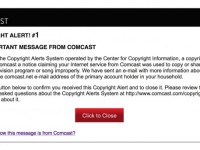As the misuse of the Canada’s copyright notice-and-notice system continues to attract attention, Industry Canada has taken the first step to try to alleviate public concern. The department has posted an advisory on the notice-and-notice system which seeks to assuage consumer concern, noting that U.S. copyright penalties do not apply in Canada and that the statutory damages cap for non-commercial infringement is C$5000. It also states:
- Receiving a notice does not necessarily mean that you have in fact infringed copyright or that you will be sued for copyright infringement.
- The Notice and Notice regime does not impose any obligations on a subscriber who receives a notice and it does not require the subscriber to contact the copyright owner or the intermediary.
This is important information that provides much needed context for the notices. As I noted last week, some Internet providers are forwarding similar information to their subscribers.











